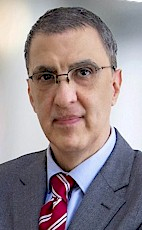Research and Education: a Connection to Ever-Evolving Expertise and Experience
By Robert O'Halloran

The skills that each manager and leader need to be successful in hospitality are a combination of operations management, traditional business functions, and specialty topics. The connection between industry experience and sustainable education practices has become increasingly important. Is there a way to best prepare managers for the diversity of tasks and traits needed to succeed in hospitality? A new and enhanced educational path can reflect enhanced occupational identification .
Occupational identification is defined as the extent to which one integrates one’s occupation into the self or one’s self-concept. Examining industry careers, one needs to assess the demand for leaders, managers, and staff for the skills, traits, and personal effectiveness to be successful. These are a combination of management and occupation-specific competencies.
From an educational perspective, the skill set for successful managers needs to be current and enhanced to improve their job readiness. The argument is that people should experience as much as possible to better appreciate, prepare, and understand their workplace demands. Job seekers need to prepare themselves and their skills for multiple entry points in a career path. Hospitality careers have evolved to be more complex than ever before. When the hotel industry connected with Wall Street and the stock exchange, the focus on profit and financials was forever changed. We cannot prepare for everything, but we should have models that will help us adapt to change as it occurs.
How is that task accomplished? One question is, what will the hospitality industry look like in the future? Not everyone will work for a big brand and have a corporate headquarters for support. The hospitality industry is full of entrepreneurs who often find that they are their own corporate office and must supply all the resources needed. Early in my career as a professor, a program graduate called me and asked if I could help him with menu planning notes and resources as he changed lanes in his career and was starting a career as a restaurant owner. He noted that he hadn’t considered starting this venture without a support network.
Going forward, if you can say anything positive about it, the pandemic functioned as a catalyst for innovation and new operating models for lodging, food service, and other hospitality segments. The decisions were adapted to the new operating environment or closed for some operations. Knowing what your business is and who you are as an operator is important to follow a path to success. Being self-aware is an important trait.
Self-Awareness
To embrace an evolving and innovative industry, one needs to assess who they are, where they are heading, or where they think they are heading. Professor Joshua Margolis at the Harvard Business School notes, “Self-awareness is about developing your capacity to sense how you’re coming across—to have undistorted visibility into your own strengths and weaknesses—and to be able to gauge the emotions you’re personally experiencing.” Additionally, Baluch infers that one tactic might be to conduct individual SWOT analyses, identifying strengths, weaknesses, possible opportunities, and threats or challenges to the career targeted. A simple self-analysis can ask questions like: What are my previous experiences? What do you enjoy? What do you dislike? Do you have a life calling? What types of skills do you have? Do you prefer to work independently or in a group setting? And what motivates or excites you most?
Creating a portfolio of work focusing on originality, work philosophy, and skill set, plus samples of your work, writing, technology expertise, projects, presentations, and Excel expertise, can be both good for a potential employer and yourself. My advice to students in college is to participate and engage with as many learning opportunities as possible to get the greatest exposure to diverse content and add to the tools you have as an aspiring leader. Some note that a diversity of expertise, maybe an ability to multitask, is useful for hospitality leadership.
Multi-Tasking (Jack of All Trades)
The hospitality industry often asks its managers and leaders to take on projects or tasks that are new to them and might require experience or additional education. In short, hospitality managers are immersed in a diversification of tasks, from traditional operations to market and promotion, technological innovations, social media tools, mobile apps, and other tasks that might include managing construction and renovations. I observe that hospitality leadership and management require an individual to be “Jack(s) of all trades, or at least multiple trades. A Jack of all trades is someone who has skill in many different areas.
You might think of yourself as a jack of all trades if you can program computers, fix plumbing, and bake a mean cupcake. Synonyms and similar descriptors could be master, expert, virtuoso, proficient, artist, connoisseur, all-rounder, adept, scholar, maestro, guru, professional, whiz–kid, ace, wizard, Renaissance man, maven, consultant, enthusiast, shark, sharp, mavin, aficionado, crackajack, authority, journeyman, devotee, fan, craftsman, hired gun, aficionado or buff. These descriptors are not a charge to be an expert at everything, but a willingness and adaptability to apply diverse tools to a hospitality manager’s job.
To be prepared for the diverse demands of a hospitality leadership role one can plan to develop strong multitasking skills, which include communication abilities, attention to detail, the capacity to solve problems quickly, an understanding of guest needs, lead and motivate teams, and nurture a positive attitude to effectively manage situationally and deliver exceptional guest experiences. Additionally, multitasking strengths are team building, motivation, conflict resolution, quality assurance, guest service, communication, interpersonal skills, problem-solving abilities, critical thinking, adaptability, decision-making, attention to detail, diverse and relevant experience, mentorship, soft skills, keeping current and on industry trends and emerging technologies to better adapt to evolving customer needs.
Multitasking skills in the workplace might include managing multiple client issues at one time, supporting several departmental projects, writing blog posts for the company’s blog that debuted on different days, planning travel arrangements for several industry conferences, and helping colleagues with technical issues. Multitasking can help students and managers gain experience and expertise by allowing simultaneous work opportunities on different tasks, exposing individuals to a wider range of skills and situations within a shorter frame, and effectively "cross-training" while building proficiency in each content area.
For example, leadership and sustainability expertise are broad “framing” skills and abilities for effective multitasking. Such traits can build a framework within hospitality businesses also between service organizations such as hospitality, healthcare, retail, grocery, and human resources, which value a hospitality professional’s skill set and could be key to creating new or enhanced competencies. Job competence implies high-performance standards, welcoming feedback, and a continuous learning mode, or what has been referred to as life-long learning. Multitasking managers are problem solvers, data-driven, and effective interpersonally.
Job competence is connected to polychronicity, which is considered the preference for multitasking. Or individuals who prefer to work on multiple tasks at the same time. This sounds a lot like a hospitality manager and leader. Multitasking is often discussed as having a negative impact on employees. I understand the thought and appreciate the discussion. However, I would also suggest that organizations that embrace employee “workplace ownership” and work engagement by their managers and employees can create an environment where employees (managers and staff) work in a state of being physically, cognitively, and emotionally dedicated to their job role. Managers and employees who refer to or think about their workplace as “Our” hotel or restaurant engage in a service process that is very different from someone just doing the job. They are engaged, dedicated, and look to learn and apply more and more. Therefore, lodging leaders must create and manage the multitasking process to benefit employees and the operation.
Indeed, shares that multitasking can increase brain power, noting the brain requires constant engagement. Multitasking is one way of keeping your brain active and boosting your brainpower and stamina. Multitasking can help the brain become more efficient in handling simultaneous tasks. The task for the lodging operation is to create that learning environment. Practically speaking, the development of additional areas of expertise increases employability. On the employee side, new traits and skills can add important line items to your resume. The hospitality industry needs to consider itself a broad and encompassing academy to promote learning and opportunity with its employees. Every business wants to keep its best employees. However, the larger goal is to keep people in the service industries, where hospitality plays a huge role, making the hospitality industry a career of choice.
Additionally, multitasking can bolster a person’s ability to collaborate and work with team members. As a professor, one thing I hear every semester from students is that they hate to work in teams. However, it is impractical to expect that all employees will work in a silo. Employees who multitask and work with others can benefit from their creativity. It is noted that thanks to a “spillover effect,” the energy and excitement of hectic jobs can lead to more original idea generation. We can all recall hectic but exciting times and feelings of satisfaction from completing a task or project, and time to recover. From the generation of original business plans to the culinary flourishes of expert chefs, it suggests that people of many different professions and workplaces might benefit.
Experiential Learning and Cross-Training
Wu et al. noted that the impact of time on organizational activities is increasingly significant, and efficient use of time is recognized as a key factor in creating a competitive advantage for businesses. Hotel work involves interacting with numerous clients, frequent task switching, and a high degree of interpersonal dependence, which demands that hotel employees utilize time effectively while managing diverse tasks. The efficiency of operations and learning through diverse experience continues to evolve, and recruiting professionals must consider more about transferable skills. For example, cross-training equips employees with the skills to perform multiple roles or tasks, ensuring continuity when regular staff are unavailable. Some argue that an ideal hospitality team is fully interchangeable and capable of supporting each other effortlessly. This enhances your organization’s agility and broadens employees’ skills, which deepens their understanding of the business’ operations and goals.
Cross-training as a standard can allow team members to contribute more effectively to the business and enhance their value within the workforce. This training method is adaptable across all hospitality sectors: lodging, food service, tourism, and more. Importantly, this premise doesn’t necessitate frequent role changes but enables employees to take on additional responsibilities as needed, enriching their primary role. Getting employees to be open-minded about cross-training starts at the top. Cross-training is not only for low-level employees; management teams can also benefit from implementing cross-training programs. “A manager who is given the opportunity to cross-train benefits in many ways,” and “they have an opportunity to experience their hotel.”
As a professor, I have found that hospitality business as a concentration helps students (future leaders and managers) visualize how the functional parts of a business all fit together. For example, a hotel has accounting, finance, sales, marketing, technology, management, and more all under one roof. Many business disciplines in a college are often siloed and do not always introduce to the student experience how businesses functionally fit together. A colleague who was a business strategy professor once told me that she could always identify students from hospitality management. When asked how, she noted they all see how the functional business areas fit together (Good for us!).
The theory would be that the more skills you have, the easier it is to explore other jobs within the hospitality industry. This flexibility contributes to career longevity, allowing you to switch to similar or adjacent roles for new challenges. Offering new opportunities and different channels for career growth can help the hospitality industry retain its best and brightest.
Educating for skilled Managers and a workforce: Multitasking and More
The ever-evolving expectations of graduates’ skills and knowledge are perhaps only matched by the transformational change rate and complex challenges that exist outside of the learning institution, as new technologies and disruptive events require students to be instilled with a preparedness for life after formal education.
In developing a curriculum for hospitality business education, we are preparing students and soon-to-be graduates with multiple skills and abilities. These skills include problem-solving, leadership, communication, financial management, attention to detail, time management, conflict resolution, a focus on interpersonal communication, multitasking, adaptability, flexibility, cultural awareness, emotional intelligence, and teamwork. Many of these topics are often referred to as soft skills. These skills and abilities provide integrated learning opportunities for students via diverse teaching methods and interactives. These skills build on core content and skills for hospitality management and leadership programs, including human resources, management theory and techniques, accounting, finance, technology, metric analysis, and decision-making (Big Data), service management, and a foundation of content on lodging, resorts, food and beverage and multiple segments in hospitality and tourism.
Universities are expected to know industry demands from both students and the wider marketplace. However, as key skills or feelings of general unpreparedness for employment are also shared by senior leaders, there is increased urgency to address such knowledge and skills gaps during their education. For industry in general, Zabojnik note d: Over the past three decades, general managerial skills (i.e., the skills transferable across companies or even industries) became relatively more important for the CEO job as a result of the steady progress in economics, management science, accounting, finance, and other disciplines, which, if mastered by a CEO, can substantially improve their ability to manage any company.
Therefore, the premise is to broaden educational opportunities for executives, leaders, managers, entry-level managers, and staff employees to benefit an organization and an employee’s career pathway.
Wrap Up
Examples of multitasking skills include organization, prioritization, delegation, and time management, which can be developed through documentation and list generation, prioritizing tasks, grouping tasks, reducing distractions, and progressive evaluation and delegation of tasks when needed (Indeed Editorial Team, 2024). Diverse skills and traits and multiple learning opportunities in hospitality and core business functions can and should be aligned with course projects and activities to better prepare students and soon-to-be graduates for a new job market.
Some argue that the hospitality industry is a calling. The draw to the hospitality industry is to work with people and engage in a non-standard workday. Lodging managers I have worked with are hard-pressed to detail a “typical day,” noting that all days will likely differ. Approaching a job as a calling helps individuals tackle stressors more effectively by reducing the negative effects of hindrance stressors and enhancing the positive effects of challenge stressors on performance. As discussed earlier, hospitality must be an industry of choice for employment and career pathways. Our job as educators is to provide students with a wide variety of authentic employability and career readiness opportunities to support each student’s work-ready preparedness in a scalable and transferrable manner.
A hospitality career calling represents a personal resource that activates further individual resources and yields successful adjustment through increased motivation and engagement. These employees, (Career Calling Employees) value collaboration and embrace transdisciplinary teaching to connect knowledge and understanding. Research on “career calling” has also examined self-determination and grit. We tell our seniors and soon-to-be graduates that learning is forever. It does not necessarily mean formal education (It can mean that I am all about getting all the education you want). Learning should never stop; position yourself as a lifelong learner while on the job. Learn from companies’ successes and failures, have a mentor either formally or informally, but be a go-to person for insights and to share their “wisdom of experience.”
Continuous learning opportunities are available all around us. Learning ideas are shared regularly through online and printed industry and trade associations, providing learning and training opportunities. Sign up for hospitality newsletters by industry experts or hotel chains you admire and wish to emulate. Join hospitality communities or organizations online or in your area. If you can attend conferences, trade shows, local Chamber of Commerce events, Convention and Visitor Bureau events, Job and Career Fairs, etc., do as much as you can. Build your network and learning community.
Sign up for podcasts and webinars that you see on your computer. I did a lot of this during COVID and still do. Many of these opportunities are sponsored and free. Experts also suggest using Artificial Intelligence (AI) via ChatGPT to review your resume, asking it to list the hard and soft skills that you are currently missing. An outside set of eyes never hurts, even digital eyes!
Teaching and learning for hospitality are ever-changing. High-quality education means more than just offering a course for every new and innovative topic. AI is a new opportunity; hospitality leaders, managers, and companies will connect and utilize it optimally. The industry will continue to evolve and grow. You cannot know everything, but always be a learner, research the topics you need, participate in educational opportunities offered, and engage in available work experiences. Lifelong learning opportunities are all around us!













